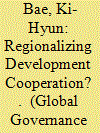| Srl | Item |
| 1 |
ID:
152746


|
|
|
|
|
| Summary/Abstract |
How is the Association of Southeast Asian Nations performing as a manager of regional cooperative activities in East Asia? Despite increasing attention regarding its role in development of East Asian regionalism, few scholarly discussions about the effectiveness of ASEAN's managerial practices at the operational level have been attempted. This article aims to fill the scholarly gap based on the author's participatory observation of discussions among practitioners regarding management of cooperative activities for ASEAN mechanisms. It suggests that ASEAN's performance as a driver of East Asian cooperation has been insufficient and may possibly have weakened the mechanisms for greater cooperation.
|
|
|
|
|
|
|
|
|
|
|
|
|
|
|
|
| 2 |
ID:
141147


|
|
|
|
|
| Summary/Abstract |
Building Community, Charter, Connectivity and Centrality – the 4Cs – is one of the most prominent goals for which ASEAN elites have continuously pledged for years. This article claims that the 4Cs are a reflection of structural concerns shared by individual ASEAN members. Specifically, the main source of the ASEAN's current practices is its members’ similar internal conditions that exposed elites to a substantial level of concerns over dual marginalization in relation to the leading countries of global governance. ASEAN elites have agreed to pursue the 4Cs, despite the 4Cs’ incompatibility with ASEAN members’ domestic practices as well as some conventional ASEAN ways of doing business, because they are expected to reduce elites’ dual concerns over becoming left-out or pushed-over within the current global governance. This explains selectivity and word–action gaps frequently observed in the ASEAN process. As elites’ concerns over being left-out and pushed-over have remained quite substantial, it is unlikely that any practices would take place if they are expected to raise either side of the concerns. Actual practices would follow elites’ words only when they are expected to mitigate fear of dual marginalization in a balanced way. To support this argument, this paper maps out the distribution of dual concerns that elites in each member state have faced and links the 4Cs’ utility to address the concerns.
|
|
|
|
|
|
|
|
|
|
|
|
|
|
|
|
| 3 |
ID:
184096


|
|
|
|
|
| Summary/Abstract |
This article investigates Association of Southeast Asian Nations (ASEAN)-level development cooperation, a relatively overlooked dimension in assessing regionalism in Southeast Asia, by examining the Initiative for ASEAN Integration (IAI). The IAI provides a unique case of experimenting with multilateral South-South development cooperation based on regional solidarity; however, despite the declared aspirations and commitments to the program, this article finds that the IAI’s actual development has been quite contrary to the declared goals. First, unlike what was expected, IAI has not been able to provide institutional benefits to help pool ASEAN-6’s resources regionally and coordinate their development programs. Second, the principle of solidarity made the IAI valuable, but it did not stand out in its actions. Third, although its primary goal was to narrow the gap among members, IAI ironically created unwanted diplomatic divide and discontent. The observations confirm a perspective that constructing ASEAN as a regional community is both driven and constrained by member states’ nationalistic priorities.
|
|
|
|
|
|
|
|
|
|
|
|
|
|
|
|
| 4 |
ID:
159848


|
|
|
|
|
| Summary/Abstract |
This paper challenges a mainstream view in ASEAN literature that ASEAN-level institutions constrain the spread of global liberal policies. It rather shows that ASEAN elites’ collective diplomatic practices have facilitated the spread of these policies by making ASEAN a lively “transfer platform” that external liberal countries can use to actively teach and study liberal policies and ideas. First, ASEAN’s methods for engaging external partners have allowed the promoting countries to earn recognition as reliable and competent partners committed to ASEAN concerns by institutionalizing the organizational bases for sustainable interactions with ASEAN stakeholders. Second, elites’ constant pledges of ambitious plans for regional integration have had positive effects in terms of lowering political costs of the promotion activities by the external partners because these activities were framed as responses to ASEAN’s voluntary turn towards liberalism. Third, thanks to ASEAN’s “let’s gather and talk” practices, the promoting countries can take advantage of ASEAN as a useful venue for expanding pan-ASEAN coalitions that can eventually become local allies supporting liberal reforms of their countries.
|
|
|
|
|
|
|
|
|
|
|
|
|
|
|
|